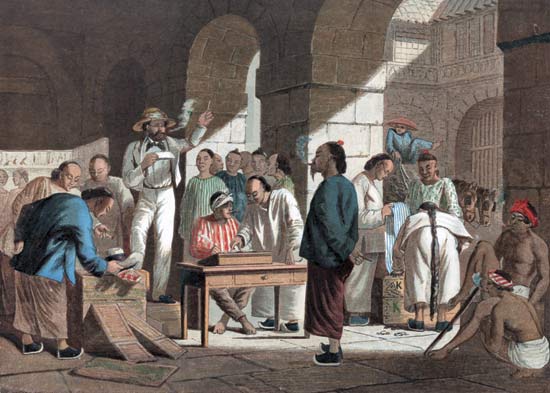 |
| Canton System |
In mid-18th century the Qing (Ch’ing) dynasty of China confined all foreign traders to the port of Canton (Guangzhou) in southern China and restricted trade. In Canton, all merchants were banned from direct contact with Chinese officials and were confined to an area of 13 factories, located outside the city walls.
All foreign traders lived in quarters that came to be known by locals as factories. Since no women were allowed to enter these factories, the nearest families were housed in Macao, a nearby town that the previous Ming dynasty had ceded to Portugal. The area became the center of foreign trade in China.
While in Canton, all trade was controlled by the Chinese merchants, known as hongs, who imported goods from inland China to trade with the merchants who arrived in Canton each year.
 |
The responsibility for overseeing Canton trading activities and for collecting all taxes was delegated by the emperor to a hoppo. The hoppo and the guild of hong merchants were held accountable for all transactions, including the behavior of all foreign merchants.
As the foreign ships arrived in Canton, they were inspected by Chinese officials and assessed tariffs, and the Chinese frequently demanded bribes. Since they were banned from learning Chinese, all traders were forced to hire local interpreters.
The Canton system of trade created resentment that was particularly strong among British traders who expected more respect of the foreign trade in China. However, as long as the foreign traders were greedy for Chinese goods such as tea, silk, porcelain, and lacquerware, they were forced to accept China’s terms.
 |
| Canton |
In return for Chinese goods, the hong merchants imported tin, copper, lead, iron, wool, cotton, and linen. Up to the end of the 18th century, China enjoyed a trade balance with Great Britain.
In June 1793 King George III of Great Britain dispatched Lord George Macartney as ambassador to China to meet with Emperor Qianlong (Ch’ien-lung) and request that China open up other ports for trading and other concessions.
The emperor responded that compliance with Macartney’s requests was inconsistent with “dynastic usage.” He also summarily refused the king’s request to open up additional ports.
   |
By 1800 foreign traders had discovered a product that an increasing number of Chinese demanded: opium. Approximately 40,000 chests, each containing 133 pounds of opium, were being imported into Canton each year by the 1830s. Although opium was banned, foreign traders continued to smuggle it into the country.
In an effort to call a halt to such smuggling, Emperor Daoguang (Tao-kuang) charged Lin Zexu (Lin Tse-Hsu) with the task of ending the opium trade in China in 1839. Lin immediately set about reinforcing China’s laws. Raids upon local opium dens netted thousands of opium pipes, but large quantities of opium remained in foreign hands.
Commissioner Lin next issued a two-pronged ultimatum to all foreign opium traders. They could either leave China immediately, or they could surrender all opium to officials. Failure to comply would result in their being prohibited in carrying out legitimate trade.
A number of traders chose to leave China, some signed a bond, but others took a wait-and-see attitude. British traders developed a plan whereby they would surrender only a few chests as tokens. Lin was not deceived and continued the standoff.
Lin then removed all Chinese servants from the offending factories. The standoff lasted 47 days before the British traders surrendered some 20,000 chests of opium containing over 3 million pounds of raw opium.
The opium of British merchants was first handed over to the British superintendent of trade in Canton, which made it British government property. Elliot then handed the chests over to the commissioner, Lin, who had them destroyed.
Major problems, however, remained unresolved between China and Britain, culminating in war. The first Anglo-Chinese Opium War (1839–42) resulted in British victory. The Treaty of Nanjing (Nanking) ended the hong system and Canton’s special position as the only port of entry in China’s trade with the West.